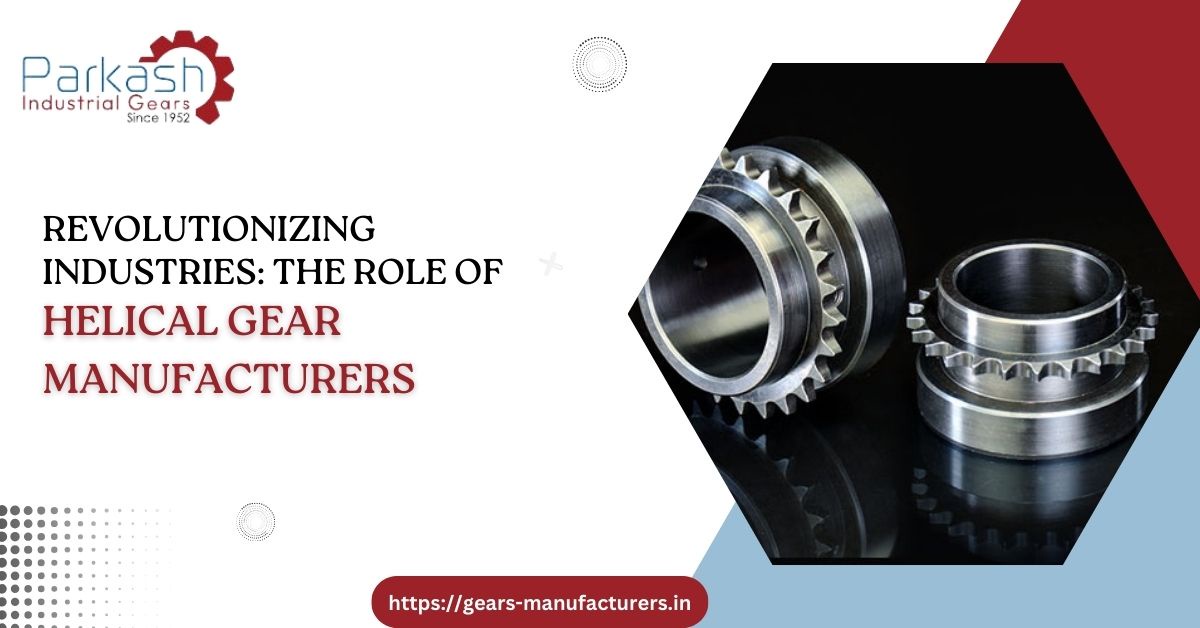Introduction
In the intricate machinery of modern civilization, gears are the unsung heroes, quietly powering everything from clocks to massive industrial machinery. Among the myriad types of gears, helical gears stand out for their efficiency, smooth operation, and versatility. These gears play a pivotal role in industries ranging from automotive to aerospace, and their production is entrusted to specialized entities known as helical gear manufacturers.
Understanding Helical Gears
Helical gears are a type of cylindrical gear in which the teeth are cut at an angle to the face of the gear. This angular orientation allows for more gradual engagement of the teeth, resulting in smoother and quieter operation compared to spur gears, which have straight teeth. The helix angle also distributes the load over several teeth at once, enhancing the gear's load-bearing capacity and reducing wear.
The Importance of Precision
Manufacturing helical gears is a task that demands precision at every step. The design and production process must adhere to strict specifications to ensure optimal performance and longevity of the gears. From selecting the appropriate materials to machining the gear teeth with utmost accuracy, every aspect requires meticulous attention to detail.
Advanced Manufacturing Techniques
Helical gear manufacturers employ a variety of advanced techniques to produce gears of exceptional quality. Computer-aided design (CAD) software enables engineers to create precise gear designs tailored to specific applications. Additionally, Computer Numerical Control (CNC) machining allows for high-precision manufacturing, ensuring that each gear meets exacting standards.
Materials and Metallurgy
The choice of materials is crucial in helical gear manufacturing, as it directly impacts the gear's strength, durability, and resistance to wear. Common materials used include alloy steels, stainless steels, and various heat-treated metals. Gear manufacturers carefully select the appropriate material based on factors such as load capacity, operating conditions, and desired performance characteristics.
Customization for Diverse Applications
One of the key strengths of helical gear manufacturers is their ability to customize gears to suit a wide range of applications. Whether it's for automotive transmissions, industrial machinery, or precision instruments, manufacturers can tailor the gear design, size, and material composition to meet the unique requirements of each application.
1. Quality Assurance
Quality assurance is paramount in helical gear manufacturing to ensure that every gear meets stringent performance standards. Manufacturers employ rigorous testing procedures, including dimensional checks, material analysis, and performance testing under simulated operating conditions. By adhering to strict quality control protocols, manufacturers can guarantee the reliability and consistency of their products.
2. Driving Innovation
Helical gear manufacturers are not just producers; they are also catalysts for innovation in various industries. By continually refining manufacturing processes, exploring new materials, and pushing the boundaries of design capabilities, these manufacturers contribute to advancements in efficiency, reliability, and performance across multiple sectors.
Conclusion
In the intricate ecosystem of machinery and mechanical systems, helical gears serve as indispensable components, translating rotational motion with precision and efficiency. Behind these marvels of engineering are the dedicated helical gear manufacturers, whose expertise and craftsmanship ensure the seamless operation of countless devices and machines. As technology advances and industries evolve, these manufacturers will continue to play a vital role in driving progress and innovation, shaping the future of mechanical engineering.


No comments yet